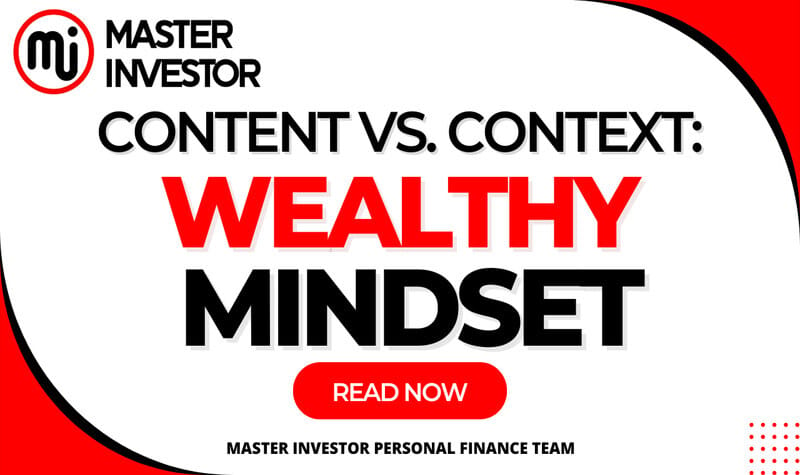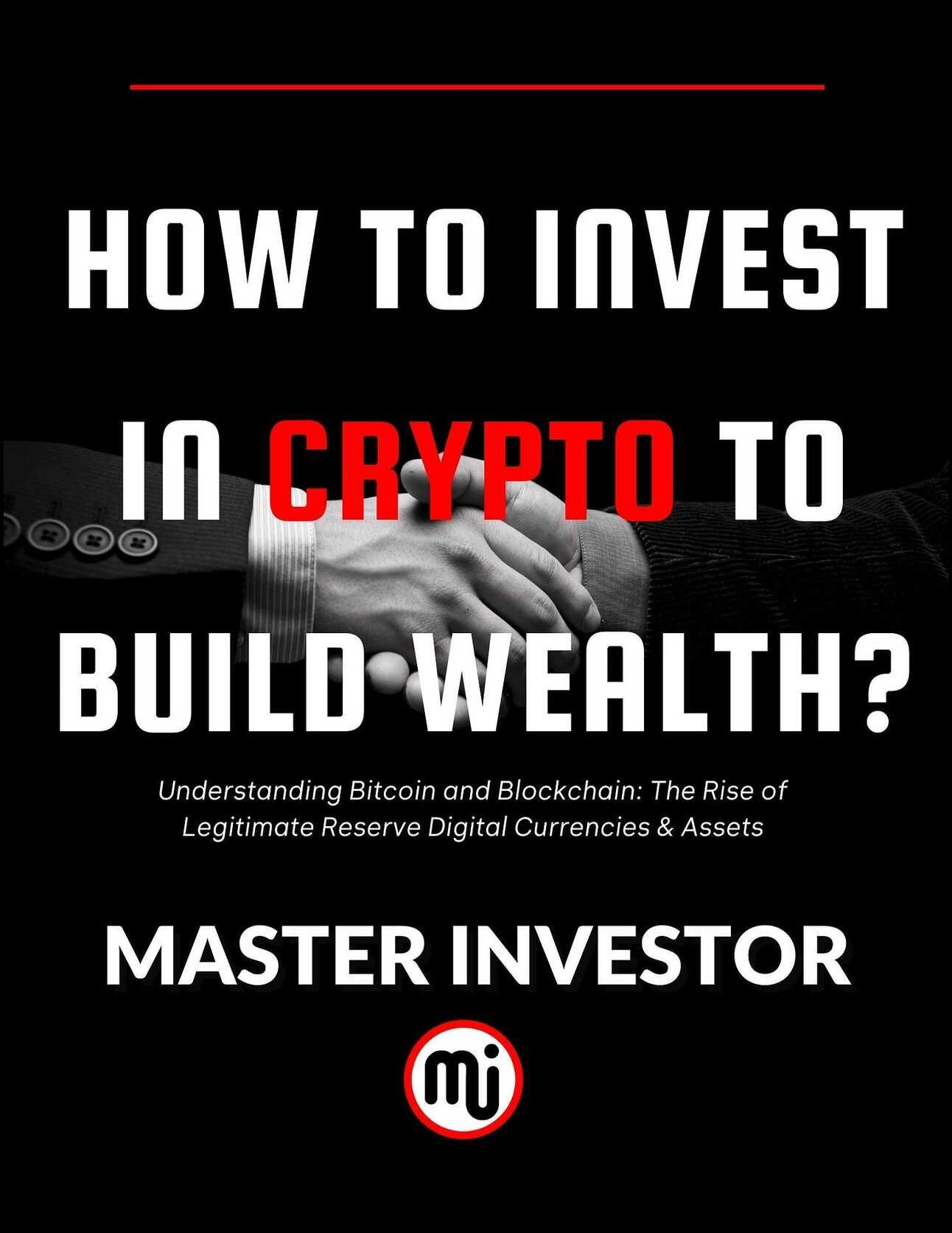
Knowing the distinction between content and context can ensure that we are offering ourselves a financial education.
The wealthy focus on context, and the poor mindset focus on content.
Changing our context begins with changing our mindset.
We want the bets for our partners at masterinvestor. We want our members to be wealthy.
Unfortunately, people in the world lack the financial education required to prepare to become wealthy, so most people rely on the playbooks they were taught by the wrong mindset to become wealthy, the poor mindset. Whether they realize it or not, they are acting in a context that feeds their heads stuff that will keep them poor. The worst aspect is that schools repeat the same behavior.
When it comes to our future, context and the content that comes from it are critical.
But first, a brief definition of context and content.
The contrast between content and context
According to Webster, context is "the interrelated conditions under which something exists or occurs."
It describes content as "a part, element, or complex of parts."
Simply said, context is the frame through which we perceive reality, and content is the information (e.g., experiences, thoughts, words, acts, etc.) that fills that frame.
The wealthy place emphasis on context. Those that are struggling financially should focus on content.
To help illustrate, consider the metaphor of a glass and liquid. For the purposes of this lesson, the liquid in the glass symbolizes content. The glass represents context.
Traditional schooling emphasizes content
Traditional education prioritizes content: reading, writing, and arithmetic are the most important things to teachers and the school system. They are the sources of water used in schools. Traditional schooling does not prioritize context: the learner. The student is the glass.
In school, we shall all ask ourselves "Why am I studying this?" The teachers (employees) responses were all the same: "If you don't get a good education, you won't get a good job." That is their background, but they also attempted to make it everyone’s context. Unfortunately, many children's contexts are altered for the worse because well-meaning but misinformed adults believe theirs is the only context. They then force-feed these children large volumes of contextually relevant knowledge.
The teachers' comments showed a lack of concern of everyone’s personal situation. The teachers assumed that we all wanted to be an employee. They prioritized their content over our context.
They assumed that everyone's context required their material. We didn't, and neither did many others. We are here to prevent the ones that are seeing o attract total freedom to unlock the unlimited wealth available to us by knowing more about business.
Context, not content, is king
We have probably heard the phrase "content is king" before. It's actually not. Context is king. Context contains the content. Contexts may be visible, invisible, human, or non-human. People find context to be very meaningful. Context shapes the course of our life.
A person's context contains:
Philosophies
Beliefs
Thoughts
Rules
Values
Fears
Doubts
Attitudes
Choices
The words of a poor person reveal their context:
"He or she will never be wealthy."
"Money is the root of all evil."
"He or she would rather be happy than rich."
"The government should take care of people."
"Spend it if he or she got it."
Many people are poor as a result of their circumstances and patterns with money. In most circumstances, more money does not make a poor person richer. Giving money to a poor person typically prolongs their poverty, sometimes permanently.
People who grow up in the middle class rarely become wealthy. Throughout their lives, they were taught that they needed to go to school, get a decent career, purchase a great house, and invest in a diverse portfolio of stocks, bonds, and mutual funds.
Every move they take serves to encourage this lifestyle. Many people go deeper into debt to "keep up with the Joneses." Instead of investing, those in the middle class simply consume more. They purchase a larger home, enjoy luxurious holidays, drive costly automobiles, and invest in further education. They adore the notion of being wealthy and wanting to appear wealthy, but they lack the context and information to understand how to become wealthy.
Because most individuals buy on credit, they frequently find themselves in greater debt—bad debt, consumer debt—rather than being wealthier.

Context is difficult to modify but possible
Many people struggle to adapt to new situations. This is because context has a deep importance for people. someone frequently confuse their context with their identity since they were taught it by someone they loved. It includes some of the first and most fundamental skills we learn in life. Changing your context can feel like changing the very essence of who we are—and in some ways, that's true.
When people from the middle class hear the phrase, "There is good debt and bad debt," their context closes.
All they know is that debt is bad and makes people poorer. Most people don't understand the concept of good debt, which is debt that can help them become wealthy.
Many of these folks might benefit from just following the bad advise of those who say, "Cut up your credit cards and get completely out of debt." This is the content that their context can manage.
When it comes to investment, most middle-class people understand that "investing is risky." This is due to the fact that most people spend in traditional education for college degrees while neglecting financial education.
Context of the Wealthy
The wealthiest face a vastly different situation than the poor and middle class. Examples of statements reflecting an affluent person's context could include:
"I must be rich."
"I own my own business, and my work is my life."
"Freedom is more important than security."
"I take on challenges so I can learn more."
"I want to find out how far I can go in life."
Most of these individuals are actual capitalists. Where the poor or middle class may sense shortage, they see abundance and opportunity. We understand how to use OPT, Other People's Talents, and OPM, Other People's Money, to become wealthy.
They don't wonder, "How can I do this myself?" Instead of saying, "how can I use the talents and money of others to get wealthy?" They do not consider investing to be risky, and consider working to be far more perilous.
So, for example, when a middle-class individual deposits their savings or retirement fund in a bank, the banker lends the money to the capitalist.
Context is more important than content.
Rich context enhances the quality of the content taught
One of the reasons people struggled in school is that we had no ambitions to work as employees. We aspired to be employers and an entrepreneur. Every time a teacher tried to push us by saying, "If you don't get good grades, you won't get a good job," we walked out since we didn't want a good job. We must outgrown the role of employee.
The phrase, "You won't get a good job," had an impact on students who desired to be employees. It didn't work for us entrepreneurs, we always mind our own business which is far more important in our opinion than spending our lives working or someone else’s dreams.
Our background enabled us to seek out the best stuff for ourselves. Self taught about the wealthy mindset and wealthy people’s patters provided us with the content required for this setting to thrive.
The lesson is, "Context determines content." If we want our future to be better off than we are now and—to be wealthy—we must discover a method to modify not only our context, but also team’s context and content. We must provide them with a context-rich financial education that alters the way they discover meaning.
For example, supposing teachers said, "Not everyone has to grow up to be an employment. Some may be business owners who hire others."Would we like to learn about that?" This opens the door for the youngsters from various backgrounds.
Today, ask ourselves: What is my context? Am I satisfied with my context? Or do I want things to change? If we want to be wealthy, we must first understand how wealthy people live and think. The same goes for our team members. And it begins with studying what the wealthy understand about money—our financial education.
Start investing in high quality financial education, by reading our financial eBooks:



Lucrative resources and tools:
Follow us on Instagram.
Listen to our Podcast.
Subscribe to our Newsletter.
Follow us on Tiktok.
Purchase a business digital Course.
Like our Facebook Page.
Join our Inner Circle.
I am reading: Content vs. Context: Wealthy Mindset
Comment, like, share and follow for more High Quality Financial Education Made Simple.

